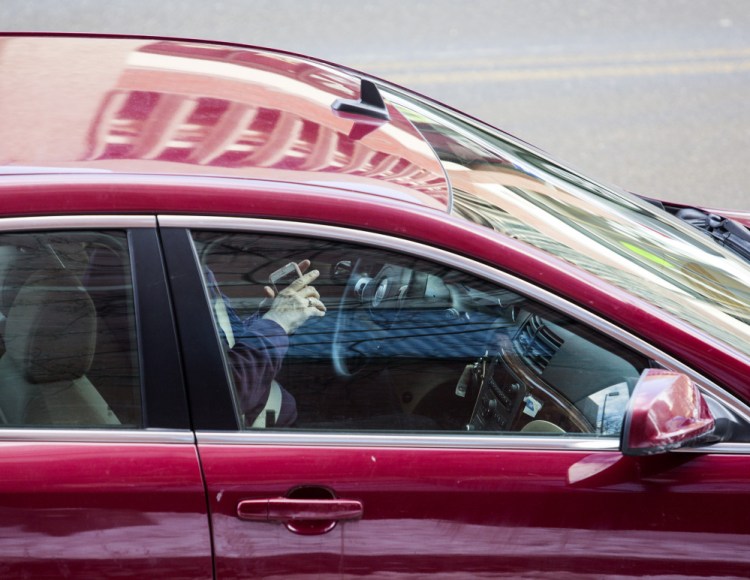Lawmakers who are making another bid to curtail distracted driving by restricting or banning drivers from using hand-held electronic devices believe the effort faces brighter prospects under a new administration.
 State lawmakers have tried passing stricter distracted driving bills in every legislative session since 2013.
State lawmakers have tried passing stricter distracted driving bills in every legislative session since 2013.
Sen. Bill Diamond, D-Windham, has sponsored a bill this session that is similar to one he authored in 2017 that got support from the Department of Public Safety and a unanimous recommendation from the transportation committee. It passed the Maine House and Senate before it was vetoed by former Gov. Paul LePage.
Diamond thinks chances are better this time around with Democrat Janet Mills in the Blaine House.
“I am feeling very positive about it, I think the current governor will look on it a little differently than the previous governor,” Diamond said. “I think the possibility of it passing is really good this time.”
Texting and driving is already illegal in Maine, but enforcement is difficult because the law is so narrow. It doesn’t include the many ways people now use cellphones like browsing social media, taking photos, shopping or using online maps.
Diamond’s proposal would simplify the law by making it illegal to use a hand-held device while driving. It expands an existing prohibition on minors using such devices to all drivers.
First-time violators could get a $75 fine, with maximum penalties of a $500 fine and a three-month license suspension for repeated violations.
“All this does is require that (drivers) have both hands free,” Diamond said. “It would be a tremendous change and improvement if we can get this passed.”
Drivers still would be able to mount devices on the dashboard or talk through a headset. Emergency personnel would be exempt and drivers could use a hand-held device in an emergency.
Distracted driving is one of the leading factors in automobile crashes, and mobile device use is one of the most visible indicators of distraction.
About 6.3 percent of drivers statewide were using a hand-held phone, an in-ear device or manipulating a device according to an April 2018 roadside survey of almost 13,570 vehicles commissioned by the Maine Bureau of Highway Safety.
The Maine Department of Public Safety estimates that distracted driving is a factor in up to 40 percent of the 35,000 annual crashes last year. Because distraction is difficult to prove, it is underreported in official crash statistics.
Sen. Ned Claxton, a freshman Democrat from Auburn, has proposed a bill that would prohibit drivers from texting or using a portable electronic device, with a higher fine – $250 for a first offense. Claxton said he intends to compare the bills and withdraw his if Diamond’s proposal achieves the same goal. Neither bill has been scheduled for consideration in the transportation committee.
If Diamond’s proposal passes, Maine will join 15 other states and the District of Columbia that ban the use of hand-held devices while driving. In New England, only Maine and Massachusetts don’t have a statewide prohibition, according to the National Council of State Legislatures.
EASIER ENFORCEMENT
Even though Maine made texting and driving illegal in 2011, enforcement is spotty. That’s because the law specifically prohibits drivers from reading or composing instant messages or an email, but it doesn’t prevent drivers from using a device for other reasons.
Citations for texting and driving have grown more than five times since 2014, from 322 that year to 1,621 in 2018.
Unless police are sure a driver was typing or reading on a device, it is easy for that person to claim they were just making a call or checking directions, said Lt. Bruce Scott, commanding officer of the state police vehicle inspections and crashes division.
“If I can’t prove you were texting, I shouldn’t be pulling you over in the first place,” he said.
His department hasn’t received guidance on its position regarding the distracted driving bills, but a hand-held ban would make officers’ jobs simpler, Scott said.
“Certainly that would be much easier to enforce, there is no question if you have a device in your hands,” he said.
In a 2017 AAA survey, nearly all drivers said texting and driving was a serious threat, and 73 percent said they supported laws against hand-held use behind the wheel. At the same time, almost half of respondents admitted they read a text or email while driving in the last month and a third said they wrote one.
While AAA supports a ban on hand-held use in Maine, it is unlikely to totally solve the distracted driving problem, said Pat Moody, director of public affairs for AAA New England. Hands-free and voice-activated technology may seem less disruptive, but they can still divide a driver’s attention, he said.
“Even with your eyes on the road and your hands on the wheel, mental distractions dangerously affect your driving performance,” Moody said. “It sounds simple but when you are driving, your focus should be on driving.”
Peter McGuire can be contacted at 791-6325 or at:
pmcguire@pressherald.com
Twitter: @PeteL_McGuire
Send questions/comments to the editors.



